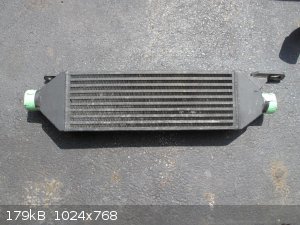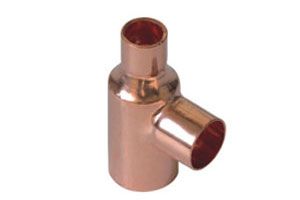Banned from the lab...
Harmless

Posts: 5
Registered: 30-9-2014
Member Is Offline
Mood: No Mood
|
|
Car radiator condenser
Lo!
I've been trying to acquire equipment for a steam distillation setup. Whilst most people generally use standard glassware condensers, I was going to
have a shot using daisy-chained car radiators submerged in 210 litre plastic barrels filled with continuously circulating water from the stream at the
bottom of my garden. Does anyone have any thoughts on this, I don't want to build this thing and then find that it has some critical flaw.
Many thanks,
Ben
[Edited on 30-9-2014 by Banned from the lab...]
|
|
|
hyfalcon
International Hazard
    
Posts: 1003
Registered: 29-3-2012
Member Is Offline
Mood: No Mood
|
|
Depends on what you're going to try to distill in it. DO NOT try to produce potable alcohol from radiators. To much opportunity for lead poisoning.
|
|
|
Banned from the lab...
Harmless

Posts: 5
Registered: 30-9-2014
Member Is Offline
Mood: No Mood
|
|
Do you think that there is a potential for lead contamination in the distillate, to a point that it becomes a problem, for 'normal' distillations?
|
|
|
violet sin
International Hazard
    
Posts: 1482
Registered: 2-9-2012
Location: Daydreaming of uraninite...
Member Is Offline
Mood: Good
|
|
what about using an oil intercooler instead of the main radiator? no antifreeze has been run through it, and they are generally smaller and more
manageable. I have seen a few left at the picking yard after some one has pulled the radiator and didn't wanna pay extra for the intercooler. they
tend to let them go pretty easy at that point.
seems like it would be a lot easier to clean out oil residue, but that may not actually be true.

regardless the opposite end hose attachments would look to make it work more like a traditional condenser, hanging vertically. a large PVC tube could
be the water supply, or a couple fans and a mister head in the open air? best cooling would probably be some kind of 2 manifold system that would
pump water through the fins, as opposed to along the length. could probably do that with wood and a router, then varnish the crap out of it...
just something I saw while picking parts for a car I used to own, kinda stuck with me I guess
|
|
|
Banned from the lab...
Harmless

Posts: 5
Registered: 30-9-2014
Member Is Offline
Mood: No Mood
|
|
Hose attachments -- might need to be carefully considered - what connectors do they generally use? If it's some bastard proprietary thing, then it
gets a bit more involved...
|
|
|
Lambda-Eyde
National Hazard
   
Posts: 860
Registered: 20-11-2008
Location: Norway
Member Is Offline
Mood: Cleaved
|
|
No way in hell. Car radiators are made with HUGE surface area in order to make air cooling effective, and you'll need to force the liquid through it
(it won't just drip off). Unless you're distilling several tens of liters, the mechanical loss will be much, much larger than your yield.
Edit: If glass is out of your price range, consider making a copper liebig condenser instead. You can either design one using readily available
plumbing parts and tubing, or go all-out and make it completely from scratch using only copper tubing. Developing practical skills, I'd say, should be
a goal of itself. Learning to cut/grind tubing to size and brazing them together should be a good excercise.
[Edited on 30-9-2014 by Lambda-Eyde]
This just in: 95,5 % of the world population lives outside the USA
Please drop by our IRC channel: #sciencemadness @ irc.efnet.org
|
|
|
violet sin
International Hazard
    
Posts: 1482
Registered: 2-9-2012
Location: Daydreaming of uraninite...
Member Is Offline
Mood: Good
|
|
https://www.youtube.com/watch?v=kPdcWWZ4Piw
|
|
|
subsecret
Hazard to Others
  
Posts: 424
Registered: 8-6-2013
Location: NW SC, USA
Member Is Offline
Mood: Human Sadness - Julian Casablancas & the Voidz
|
|
A home-made copper condenser is definitely your best option, if you use lead-free solder or brass (as Lambda-Eyde said). I constructed a ~300 mm
copper condenser for high-temperature experiments (such as pyrolysis reactions), using these tee fittings:

The condenser is made with a half-inch hard copper pipe in the "straight" hub of the tee, and a 3/4 inch pipe surrounding it. The smaller pipe
protrudes from either end, and threaded fittings are attached so the device can be used with various other fittings. During operation, cold water
flows through the side port on the condenser, between the concentric pipes, and out the side port on the other tee fitting, just like a normal Liebig
condenser. Here's what it looks like, though this isn't my video:
https://www.youtube.com/watch?v=sYyw_hrXrZ8
If you choose to construct this sort of condenser, remember to file down the small protrusions that keep the half-inch pipe from sliding through the
tee fitting. I used a Dremel tool to remove the edge.
A simpler setup would be a coil of copper pipe in a barrel of water.
Edit: Some grammatical corrections.
[Edited on 1-10-2014 by Awesomeness]
Fear is what you get when caution wasn't enough.
|
|
|
hyfalcon
International Hazard
    
Posts: 1003
Registered: 29-3-2012
Member Is Offline
Mood: No Mood
|
|
Of course there are some real artists out there.
http://www.coppermoonshinestills.com/
|
|
|
forgottenpassword
Hazard to Others
  
Posts: 374
Registered: 12-12-2013
Member Is Offline
Mood: No Mood
|
|
You don't even need to make a water jacket. A length of copper tube immersed in a tub of water will condense water vapour.
[Edited on 1-10-2014 by forgottenpassword]
|
|
|
Scr0t
Hazard to Others
  
Posts: 118
Registered: 14-1-2012
Location: Europe
Member Is Offline
Mood: Desiccated
|
|
The risk of lead poisoning is not just theoretical when using car radiators. I have read of several cases where lead poisoning was caused from
bootleggers doing just that.
|
|
|
Banned from the lab...
Harmless

Posts: 5
Registered: 30-9-2014
Member Is Offline
Mood: No Mood
|
|
Yeah, lead poisoning is not fun. +Lambda-Eyde , I don't quite understand what you mean, please could you clarify?
|
|
|
Rogeryermaw
National Hazard
   
Posts: 656
Registered: 18-8-2010
Member Is Offline
Mood: No Mood
|
|
copper/brass radiators are not as common as they used to be. most are plastic/aluminum these days and use no solder. there are also performance style
parts that are all aluminum but at the cost, you may as well just buy glass. if a radiator is in your future, the salvage yards will sell a plastic
aluminum a lot cheaper than copper due to price and they can be well flushed(ask me how i know).
cheaper still and probably far superior for the job would be a heater core. they are smaller and have more manageable hose connections. i have all
aluminum heaters at my shop for $35.
|
|
|
Banned from the lab...
Harmless

Posts: 5
Registered: 30-9-2014
Member Is Offline
Mood: No Mood
|
|
Ah, I hadn't realised that the aluminium radiators contained no lard solder. I'm a bit concerned about plastic parts though. If I choose to go down
the radiator route for sake of practicality, what kind of plastic am I looking at (concerned about melting points...)
|
|
|
violet sin
International Hazard
    
Posts: 1482
Registered: 2-9-2012
Location: Daydreaming of uraninite...
Member Is Offline
Mood: Good
|
|
Rogeryermaw: a heater core would be smaller than a lot of intercoolers that I suggested. I did however just pick the first random pic I could. some
of the oil coolers are nice and small, with flare fittings that would accommodate copper. The one that made me think about trying it years back, was
smaller than a a cake mix box you might get at the supermarket.
|
|
|